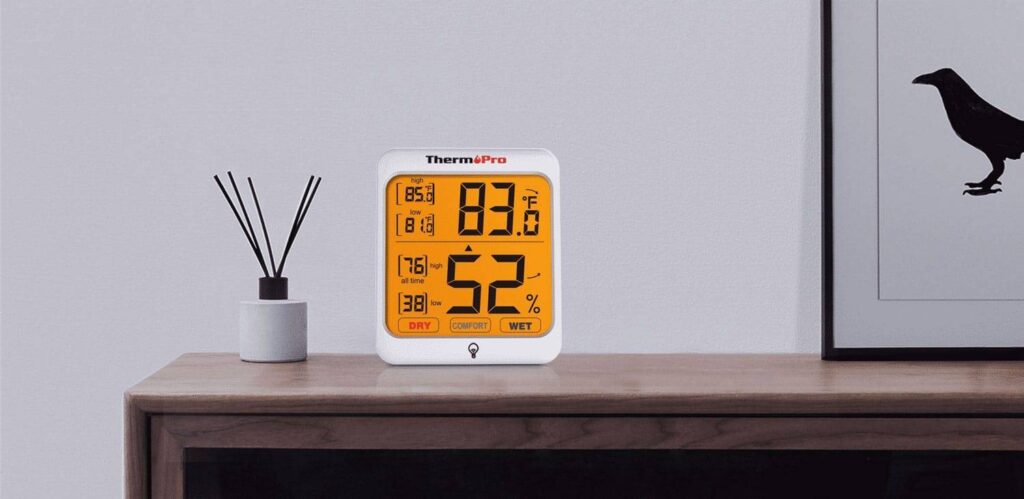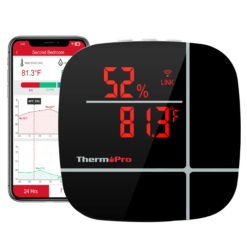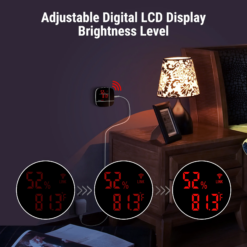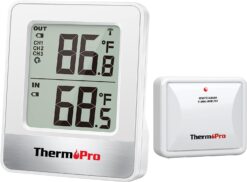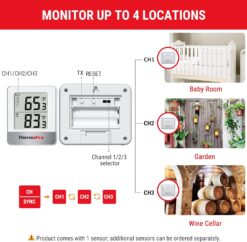Warehouses are critical components of supply chains in Kenya, serving as storage spaces for a wide range of goods, from agricultural products to electronics and pharmaceuticals. Maintaining optimal environmental conditions in these warehouses is vital for preserving the quality and longevity of stored goods. One of the key environmental factors that must be controlled is humidity, as it can significantly impact the integrity and quality of stored products. This is where hygrometers come into play, providing accurate humidity readings and enabling warehouse managers to take corrective action before moisture-related problems arise.
In this article, we will explore why hygrometers are essential for warehouses in Kenya, the consequences of poor humidity control and how specific ThermoPro hygrometers can help manage humidity levels effectively.
The Impact of Humidity on Warehouses
Humidity refers to the amount of moisture in the air, and it has a significant impact on the condition of various goods stored in warehouses. If humidity levels are not properly controlled, it can lead to serious problems, including:
- Product Deterioration:
- Excessive humidity can cause certain goods to absorb moisture, leading to product degradation. For instance, food products such as grains and flour can become moldy, and packaging materials like cardboard boxes can become weak or soggy.
- Rust and Corrosion:
- Metals stored in warehouses are susceptible to rust and corrosion when exposed to high humidity levels. This is particularly concerning for industries that store machinery, automotive parts, or construction materials, which can be severely damaged by moisture over time.
- Electronic Damage:
- High humidity can damage sensitive electronic components stored in warehouses. Circuit boards, chips, and electrical devices can short-circuit or malfunction when exposed to moisture.
- Condensation Issues:
- If the temperature fluctuates, condensation may occur on surfaces within the warehouse, especially if humidity is high. Condensation on packaging, products, or warehouse equipment can cause further issues, such as mold growth or mechanical failure.
- Increased Risk of Mold and Fungi:
- Mold and fungi thrive in humid environments, which can lead to health risks for employees and spoilage of stored products, particularly in food storage warehouses.
Given these risks, it is essential for warehouse operators in Kenya to monitor and control humidity levels. Hygrometers are the most effective tools for achieving this.
The Role of Hygrometers in Humidity Control for Warehouses
Hygrometers measure the relative humidity (RH) in the air, providing real-time data that allows warehouse managers to make informed decisions about their storage environment. Here’s why hygrometers are indispensable for Kenyan warehouses:
- Accurate Monitoring:
- Hygrometers provide precise readings of humidity levels, allowing managers to maintain conditions within the ideal range for the products stored. For example, food warehouses often require humidity levels to be kept between 30% and 50%, depending on the type of food being stored.
- Preventing Product Damage:
- By using hygrometers, warehouse operators can quickly identify when humidity levels are approaching dangerous thresholds and take corrective action, such as adjusting ventilation or activating dehumidifiers. This proactive approach prevents damage to goods and reduces financial losses.
- Ensuring Regulatory Compliance:
- Certain industries, such as pharmaceuticals and food storage, are required by law to maintain specific environmental conditions in their storage facilities. Hygrometers help ensure that warehouses remain compliant with industry regulations by providing continuous humidity monitoring and logging data for audit purposes.
- Maintaining Product Shelf Life:
- Proper humidity control helps extend the shelf life of products. For example, in warehouses storing grains or dry goods, maintaining optimal humidity prevents the growth of mold and insects, thereby preserving the quality of the products for a longer period.
- Cost Savings:
- By preventing moisture-related damage to products, packaging, and warehouse infrastructure, hygrometers help reduce the costs associated with product losses, repairs, and waste. This translates into higher profitability for businesses.
Recommended Hygrometers for Warehouses in Kenya
ThermoPro offers a range of high-quality hygrometers that are ideal for monitoring humidity in warehouses. Below are some of the top models suitable for Kenyan warehouses:
1. ThermoPro TP90: Smart WiFi Thermohygrometer
- Key Features:
- WiFi-enabled for remote monitoring
- 2.4 GHz connection for stable data transmission
- Allows for real-time humidity and temperature tracking via the ThermoPro app
- Ideal for large warehouses, as it transmits data directly to mobile devices, allowing managers to monitor conditions even when off-site
- Alerts users if humidity levels fall outside of predefined parameters, ensuring timely corrective action
How It Helps: The ThermoPro TP90 is particularly useful in large-scale storage facilities, where constant monitoring is critical. The app-based remote monitoring system allows managers to track conditions even if they are not physically present at the warehouse. For example, in a warehouse storing perishable goods, the TP90’s real-time alerts can prevent temperature and humidity fluctuations that could spoil inventory.
2. ThermoPro TP200B: Waterproof Thermohygrometer
- Key Features:
- Waterproof sensor for monitoring humidity in high-moisture environments
- Suitable for outdoor sections of warehouses or moisture-prone areas
- Long-range wireless transmission for monitoring humidity in large spaces
- Durable design, making it ideal for demanding environments like refrigerated or cold storage facilities
How It Helps: In warehouses that store products requiring a high level of moisture control—such as cold storage facilities—ThermoPro TP200B provides accurate humidity readings despite the presence of condensation or moisture. The waterproof feature ensures long-term reliability even in challenging conditions.
3. ThermoPro TP60C: Wireless Thermohygrometer
- Key Features:
- Wireless transmission of humidity data over long distances
- Can monitor multiple zones within the warehouse using different sensors
- Ideal for maintaining humidity levels across large warehouse spaces
- Easy-to-read display for real-time monitoring
How It Helps: In large warehouses where different areas may have varying humidity levels, the ThermoPro TP60C can be used to monitor multiple zones. This helps warehouse managers identify areas where humidity control measures need to be applied and ensures uniform conditions across the storage facility.
Indoor Thermometer
ThermoPro TP200B: Waterproof Thermometer – Outdoor & Indoor Thermometer
Warehouse Applications of Hygrometers in Kenya
1. Food and Agricultural Products Storage
- Food products, especially grains and cereals, are highly sensitive to humidity. Excessive moisture can cause spoilage, mold growth, and insect infestations. Hygrometers like the ThermoPro TP60C can be used to ensure that humidity remains within safe levels, preventing food degradation and preserving quality.
2. Pharmaceutical Warehouses
- Pharmaceuticals require strict environmental conditions for storage, with particular attention to humidity and temperature. In Kenya, where temperature and humidity can vary significantly, using a hygrometer like the ThermoPro TP90 ensures that sensitive products, such as vaccines and medications, remain potent and safe for use.
3. Cold Storage Facilities
- Cold rooms and refrigerated warehouses often store perishables such as fruits, vegetables, dairy products, and frozen goods. Maintaining the right humidity level is crucial to preventing frost buildup, condensation, and mold growth. Hygrometers such as the ThermoPro TP200B can be used to monitor these environments and ensure the integrity of stored goods.
4. Electronics and Metal Storage
- Humidity can cause corrosion in metals and damage sensitive electronics. Warehouses storing these types of goods need reliable humidity control to prevent rust, oxidation, and electrical malfunctions. The ThermoPro TP90 is an ideal tool for these applications, as it can provide real-time monitoring and alerts to prevent damage.
In conclusion, hygrometers play an essential role in maintaining optimal conditions in warehouses across Kenya. Whether it’s preventing product degradation, protecting sensitive electronics, or ensuring compliance with regulatory standards, hygrometers provide the data needed to safeguard stored goods from the adverse effects of humidity.
By investing in high-quality hygrometers like the ThermoPro TP90, TP200B, or TP60C, warehouse operators can protect their inventory, reduce costs, and improve the efficiency of their operations. With Kenya’s growing industrial and agricultural sectors, hygrometers are more than just monitoring tools—they are essential components of modern, sustainable warehousing practices.

